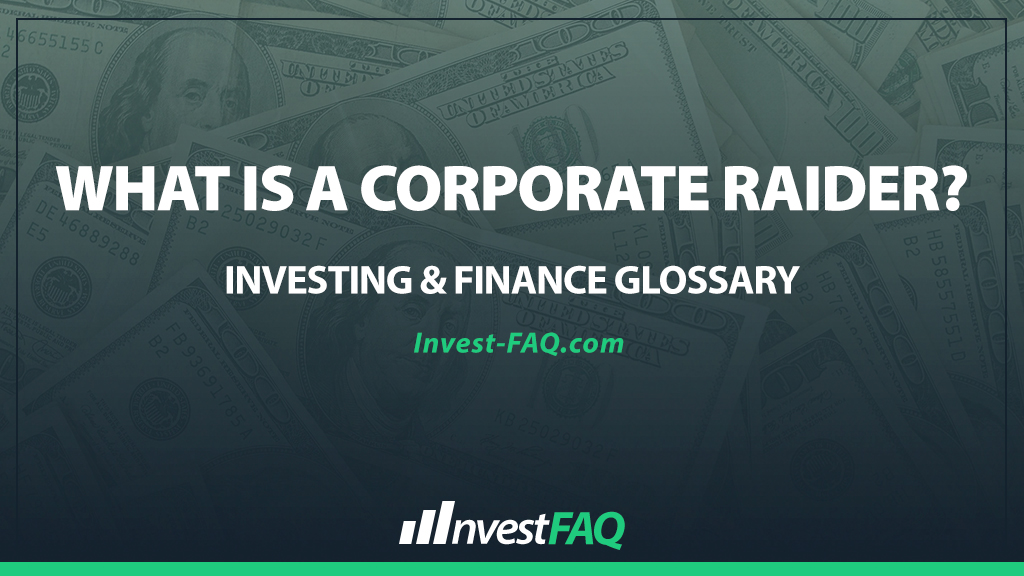
Corporate Raider
Contents
A corporate raider is an investor or group of investors who purchase a large stake in a company with the aim to gain significant influence or control over its management and policies, often against the wishes of the current management. The ultimate goal is typically to implement changes that will increase shareholder value, which can include restructuring the company, selling off assets, or merging with another company.
Corporate raiders play a controversial role in business. They argue that their actions pressure companies to operate more efficiently and profitably, benefiting all shareholders.
Critics, however, contend that raiders focus on short-term gains at the expense of the company’s long-term health and employee well-being. The term itself has a negative connotation, implying aggressive, unwelcome intervention by the raider.
Example of a Corporate Raider
Imagine “Tech Innovations Inc.,” a publicly-traded company experiencing stagnant growth and undervalued stock. A corporate raider, “Equity Ventures,” buys 15% of Tech Innovations’ shares on the open market and begins a campaign to elect its representatives to the board of directors. Once successful, Equity Ventures pushes for the sale of underperforming divisions and a massive stock buyback program.
In this scenario, Equity Ventures’ acquisition of a significant stake in Tech Innovations Inc. allows it to influence company decisions, aiming to unlock value for shareholders.
The sale of underperforming divisions could streamline operations and focus resources on more profitable areas, while a stock buyback program could raise the share price. However, these moves could also lead to layoffs and a reduction in company size, illustrating the dual nature of corporate raider strategies.
Types and Uses in Business Scenarios
Corporate raiders can be involved in various business scenarios, including:
Proxy Fights: Attempting to replace management or board members through a vote by shareholders.
Leveraged Buyouts (LBOs): Acquiring a controlling interest in a company primarily through debt.
Asset Stripping: Selling off a company’s assets for profit, often after taking control.
These strategies are used to either turn around underperforming companies or to dismantle them for their asset values, depending on the raider’s assessment.
Significance for Investing & Finance
From an accounting perspective, the activities of corporate raiders can have significant implications:
Asset Valuation: The threat or action of asset stripping can require revaluation of company assets, impacting the balance sheet.
Financial Restructuring: Efforts to restructure a company can lead to significant changes in how a company’s finances are organized and reported, including debt restructuring and changes in equity.
M&A Accounting: Mergers or acquisitions initiated by corporate raiders involve complex accounting, including the allocation of purchase price, goodwill calculation, and consolidation of financial statements.
In summary, corporate raiders are investors who seek to gain control of a company to make changes that they believe will increase shareholder value.
While their strategies can lead to significant financial improvements, they often raise ethical and strategic concerns about the long-term impacts on the company and its employees. The involvement of corporate raiders requires careful consideration of accounting principles, especially regarding asset valuation and financial restructuring.
FAQ
What motivates a corporate raider to target a specific company?
Corporate raiders typically target companies they perceive as undervalued or poorly managed, believing that through strategic changes, asset sales, or management restructuring, they can significantly increase shareholder value.
How do corporate raiders acquire control or influence over a company?
Corporate raiders gain control or influence by purchasing a significant portion of a company’s shares on the open market or by convincing other shareholders to support their strategic initiatives, often culminating in a proxy fight for board representation.
What are the common outcomes of a corporate raider’s involvement in a company?
The involvement of a corporate raider can lead to outcomes such as restructuring of the company, sale of underperforming assets, management shake-ups, or even the company being sold entirely, all aimed at increasing short-term shareholder value.
How do companies defend themselves against corporate raiders?
Companies may defend against corporate raiders by adopting “poison pill” strategies, enhancing shareholder rights plans, or undertaking other measures designed to make a takeover less attractive or more difficult to accomplish.
